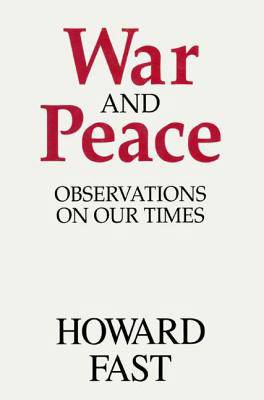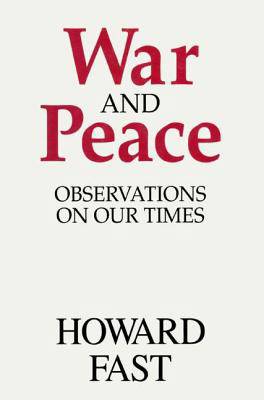
- Retrait gratuit dans votre magasin Club
- 7.000.000 titres dans notre catalogue
- Payer en toute sécurité
- Toujours un magasin près de chez vous
- Retrait gratuit dans votre magasin Club
- 7.000.0000 titres dans notre catalogue
- Payer en toute sécurité
- Toujours un magasin près de chez vous
Description
In more than 100 essays, written over a three-year period for the "New York Observer", Howard Fast looks with horror at the official violence inflicted on Nicaragua, El Salvador, Grenada, Panama and Iraq and the unofficial violence that is taking place in the cities of the United States. In "War and Peace", Fast summons us to face the wars and the social disintegration that degraded the Reagan and Bush years, with all the explanations and excuses stripped away. He dwells on the monumental folly of the Cold War and shows us repeatedly what we could have done with the billions spent on planes, bombs and guns if we had spent them on the education and safety of our children, on housing, medical care, rebuilding the cities - and what we can still do in the future. As in Swift, Yahoos populate the essays of this book: the drug dealers; the local political hacks; the anti-Semites; the racists; the women-bashers; the arms traffickers: the whole unsavory cast. As in Mencken, boobs run loose in the White House and in the halls of Congress. From time to time, a Candide-like character named D'emas (Yiddish for the "the truth") appears and asks embarrassing questions about the ways of our civilisation, which his interlocutor is hard-pressed to answer. And yet, after Howard Fast recounts the inanity and brutality of these years, he offers a humane vision of what America and the rest of the world could be. These essays should hold a place in 20th-century letters as a statement of unsurpassed passion on the theme: war and peace.
Spécifications
Parties prenantes
- Auteur(s) :
- Editeur:
Contenu
- Nombre de pages :
- 304
- Langue:
- Anglais
Caractéristiques
- EAN:
- 9781563242076
- Date de parution :
- 31-12-92
- Format:
- Livre relié
- Format numérique:
- Genaaid
- Dimensions :
- 152 mm x 229 mm
- Poids :
- 639 g

Les avis
Nous publions uniquement les avis qui respectent les conditions requises. Consultez nos conditions pour les avis.






